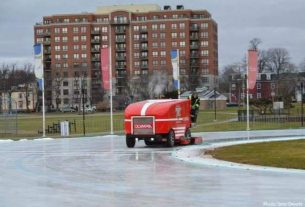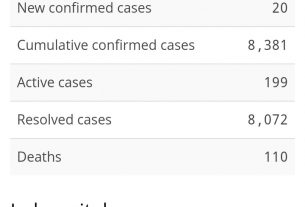**** CNS Media Release
Protecting yourself from coronavirus

There are currently no vaccines available to protect you against the novel coronavirus. Nova Scotians are encouraged to think about what they can do to stay healthy and prevent the spread of any respiratory illness, including COVID-19.
There are simple, practical things you can do to prepare in case you or someone in your household becomes ill or if COVID-19 becomes common in your community.
Advice for individuals and families
Reducing contact with other people
Nova Scotians are required to practice social distancing to help reduce the spread of COVID-19. Social distancing means limiting your contact with other people – stay about 2 metres (6 feet) apart.
Government is requiring individuals, employers and organizations to limit social gatherings to no more than 5 people.
Avoid:
- group gatherings (ex: parties, weddings, funerals, bridge clubs)
- visitors in your home
- sleepovers and playdates and other social interactions with friends
- public spaces (ex: malls, gyms, theatres, crowded stores)
- parks
- non-essential travel
- athletic events
Use caution:
- grocery stores
- pharmacies
- gas stations
- essential medical appointments
- take out restaurants
- public transit
- essential travel
Safe activities include:
- Spring cleaning
- TV, books, music, movies at home
- sit on your deck
- a walk in your neighbourhood
- yard work
- cook a meal
- Call, message, video chat loved ones
Practise good hand hygiene
Wash or sanitize hands often, particularly:
- before and after preparing or eating food
- after touching pets
- after handling waste, dirty laundry or bathroom use
- whenever hands look dirty
- after shaking hands
Washing with soap and water is preferred – rubbing hands together removes visible dirt and germs. Use disposable paper towels (preferred) for drying hands, or a reusable towel that is laundered often.
If soap and water aren’t available (and your hands aren’t visibly dirty), use an alcohol-based hand sanitizer with at least 60% alcohol. Use enough to cover the fronts and backs of both hands and between all fingers. Rub hands together until they feel dry.
Use cough and sneeze etiquette
Cover coughs and sneezes with a tissue. Dispose used tissues in the garbage and wash your hands, or use an alcohol-based hand rub immediately after.
If you don’t have a tissue, cough and sneeze into your elbow, not your hand.
Avoid touching your eyes, nose, and mouth with unwashed hands.
Clean high-touch surfaces and objects often
Viruses can live on surfaces for several days. Frequent cleaning and disinfecting of high-touch surfaces and objects can reduce germs and prevent infection. You should clean at least once a day, or more if needed.
Clean and disinfect items like doorknobs, light switches, railings, toilets and tabletops daily. Wash with soapy water first. Then disinfect using household cleaning products, following the directions on the label, or a solution of 1 part bleach to 9 parts water.
Disinfect phones, remote controls, computers and other handheld devices with 70% alcohol or wipes.
Wash or launder clothing, sheets and towels on a regular basis.
Dispose of garbage on a regular basis. Wash hands after.
Make a plan
Being prepared is good advice any time.
All Nova Scotians should have an emergency kit and basic supplies that you/your family may need for up to 72 hours. Don’t panic buy or stockpile.
Make sure your prescriptions are filled.
Think about what you’ll do if you or member of your family becomes sick and needs care.
Talk to your employer about working from home if you need to self-isolate or care for a family member who is ill.
Communicate with family and friends. Let them know you’re making a plan. Share yours with them. Check in on each other and run essential errand should one of you become ill.
If you become ill, stay home until you are no longer showing symptoms.
Mental well-being
A new virus like COVID-19 can create fear and anxiety. The best ways to address concerns and support each other include:
- listen and provide reassurance – it’s normal to have questions
- get information from reliable sources
- address questions and correct misinformation
- watch for discrimination or bullying related to COVID-19
- maintain normal routines and programming as much as possible
For help with mental health concerns, call 811 or the Mental Health Crisis Line toll-free at 1-888-429-8167.
Advice for employers and community groups
Employers should think about what they can do to help staff stay healthy and prevent spread of any respiratory illness, including COVID-19.
Support your employees if they need to stay home
The Province of Nova Scotia, under the authority of the Health Protection Act, is requiring anyone who has travelled outside Nova Scotia to self-isolate for 14 days from the day they get back to the province, even if they do not have symptoms.
Employers cannot require a doctor’s note if an employee must be off work.
Consider how you can support your employees while they’re in self-isolation. Talk with your employees about flexible hours or alternative work arrangements if they are required to stay home.
Consider limiting events
Businesses and community groups are required to limit events and social gatherings to no more than 5 people. This could include events like weddings, religious services, movie screenings and concerts. This will help protect vulnerable Nova Scotians who are at risk for serious illness.
Other steps businesses and community groups can take
As well as following the advice for individuals, businesses and community groups should:
- make sure you have a business continuity or emergency plan in place
- think about what you’ll do if several of your employees get sick
- post handwashing signs and provide alcohol-based hand rub to encourage frequent hand hygiene
- make sure spaces and surfaces are cleaned
- remove non-essential items like magazines, stuffed toys, and other items that can’t be easily cleaned from reception areas



